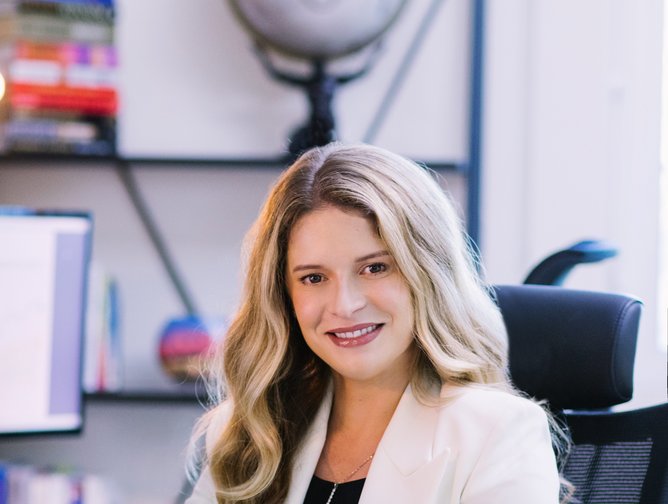Why US real estate is hot property for Middle East investors

Recently, the world’s largest Sovereign Wealth Fund, the Abu Dhabi Investment Authority (ADIA) with $800bn in assets, increased its target allocation for North America from 45% to 60%.
It’s a story playing out across the Middle East region, as regional investors capitalise on growth from the resurgence of oil prices and look to strengthen their global diversification.
A large part of the attraction for Middle East investors in the U.S. is in the real estate market. Thanks to its stability, security, and growth, the U.S. is now the most preferred market while real estate is now the most preferred asset class for all ME-based sovereign wealth funds, according to Sovereign Wealth Fund Institute research, (SWFI).
The time to invest in U.S. real estate is now, says Rebecca Moreira, co-founder and managing partner of Glenwood Equity, which has partnered with U.S.-based Patel Family Office to set up new bases of operation in Abu Dhabi, Riyadh, Sharjah, Kuwait, Bahrain, Istanbul, Jeddah, Oman, Qatar, and Doha.
The local bases will liaise with the partnership’s Dubai hub to support high net worth private investors, wealth advisers, and strategic partners seeking asset backed , capital-protected, structured opportunities.
Ahead of the exclusive by-invitation launch event for select professional investors at DIFC’S Capital Club Dubai on February 2, Business Chief caught up with Rebecca to find out more about Middle East investment motivations and trends – why interest in the U.S. real estate market is rising, why co-investments are an attractive option regionally, and how attitudes towards ESG are shifting in the region.

Why is the Middle East region carrying the strongest investment momentum right now?
At Glenwood we understand that there is a desire to reduce reliance on the oil economy and increase diversification through investment in other sectors both domestically and internationally. These nations will benefit from US$1T in additional revenue over the next four years due to the increase in commodity prices. At Glenwood, we believe this additional revenue could be strategically deployed to capitalise on wavering economical environments elsewhere that can bolster their diversification efforts. Thus, creating a relatively strong investment momentum.
There is an increase in private wealth in the Middle East that is significantly higher than other major economies. This growth in private wealth is expected to continue in the region. This could be attributed to increased government spending, positive investor sentiment locally, as well as the USD peg to several local currencies.
Increasingly, Middle East investors are looking to the U.S. as a preferred location for global investment. Why is the U.S. market an attractive one?
At Glenwood our Middle Eastern investors are bullish on the U.S. for two main reasons. First, oil-producing Middle Eastern countries are benefiting from the increase in commodity prices and a relatively robust economy at home. Second, the U.S. elections are fast approaching at the end of 2024. The trough of the Great Recession of ’08 lasted six months and it is estimated that this bottom out will be shorter.
We feel that investing in the U.S. now while assets are on discount and commodity prices remain high, provides an opportunity to make a healthy return in both the short and long term from robust assets like multifamily and industrial real estate.
At Glenwood, we have owned and operated assets internationally and the U.S. has consistently demonstrated resilience across multiple asset classes. The U.S. has the largest consumer market in the world, the strongest GDP of $20T and a population of 325 million. It also ranks among the best repeadtedly for overall ease of doing business, offers a robust regulatory infrastructure, predictable legal system, and a business culture that encourages free enterprise and competition.
Middle Eastern investors come to us at Glenwood because they are looking for that long-term stability and growth that USD denominated income can offer. This is further exacerbated by the currency peg between the USD and several GCC currencies providing zero currency fluctuation risk.
When it comes to FDI into the U.S., international investors get to compete on a level playing field across almost all sectors which increases its competitive advantage as a global player in the investment space.
What are the asset classes that UHNWIs in the Middle East region invest in?
Our proprietary research model on the market shows that UHNWIs seek global diversification as an imperative part of portfolios for long term stability and growth. Family offices and Sovereign Wealth Funds (SWF) in the Middle East, for instance, prefer real estate as an asset class, contributing approximately 30-40% of the portfolio.
We are already seeing SWF increase their US allocation to capitalise on a relatively robust local economy to acquire assets at a discount overseas.
The world’s largest SWF, the Abu Dhabi Investment Authority (ADIA) with $800 billion in assets, recently increased its target allocation from 45% to 60%. Investors come to us at Glenwood because real estate offers that stable element to investors’ portfolios due to its multidimensional benefits such as consistent cashflow and capital appreciation.
Specifically, in 2022 there was an uptake in SWFs acquiring industrial, logistics and living real estate asset classes over office and retail driven by the rise in e-commerce and shortage in housing.
The MENA SWFs have benefitted from taking a proactive approach to investments in private markets by allocating the highest per cent to private markets compared to the other major regions globally.
Why is real estate in the U.S. an attractive option?
The U.S continues to outperform other developed economies in terms of rent increases. In the industrial segment, rents increased by 16% driven by increases in e-commerce and 19% in housing driven by a housing shortage and recent rate hikes creating an even higher barrier to home ownership, thus, a stronger renter pool. It is also expected that 1.2m people will enter senior living age every year in the US, increasing the need for specialised assisted living facilities.
We feel that investing in the US now while assets are on discount and commodity prices remain high, provides an opportunity to make a healthy return in both the short and long term from robust assets like multifamily and industrial real estate.
What are some of the other trends you are seeing with Middle East investors?
Co-investing among family offices has increased due to a higher interest to acquire higher value assets with other family offices. Other M&A’s and strategic partnerships are also expected to rise to increase the competitive advantage in certain sectors.
Co-investments are minority investments directly in companies alongside the lead sponsor – it enables HNWIs and institutional investors to increase their exposure to lucrative assets with lower fees to maximise their returns.
At Glenwood, we have a long history of co-investing and there has been a greater interest in this strategy in the last 20 years. It is estimated that more than $175b was raised in co-investment structures since 2000.
Co-investments can bring a wealth of benefits to investors’ portfolio and the UAE is at the heart of Glenwood’s inception. Glenwood is the only fintech platform that facilitates real estate co-investment opportunities for Middle Eastern investors across multiple real estate asset classes in the U.S.
And what about attitudes towards ESG? How important are ESG considerations for ME investors today?
Attitudes towards ESG are shifting in the region, particularly businesses with a global presence and are looking for Green rated buildings to satisfy ESG initiatives.
Through our research at Glenwood, it is estimated that 90% of office buildings in developed cities are more than 10 years old and would not meet energy efficiency standards that are in place today. Further, 80% of office buildings which are in operation today will still be in use in 2050.
Liquidity, pricing, and debt are determined by a buildings profitability and emissions are a prevailing component already accentuated by rising energy costs and labor shortages. Many companies now place a bigger emphasis on their commitments to Net Zero Carbon (NZC) which will increasingly influence their decision to occupy one building over another.
At Glenwood, we ultimately believe that businesses/tenants and real estate owners must work collaboratively at an accelerated pace to mutually meet NZC targets.
An exclusive by-invitation launch event for select professional investors will be held at the Dubai International Financial Centre (DIFC)’s Capital Club on February 2. www.glenwoodequity.com






